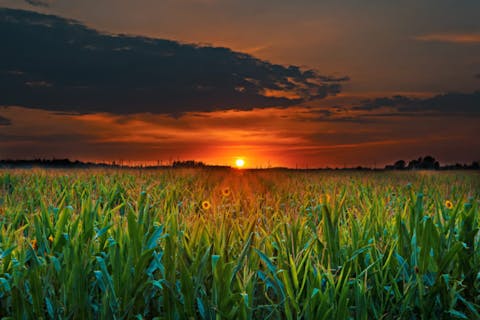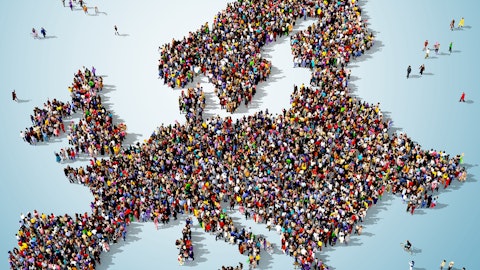In this article we will list the 12 biggest pesticide companies in the world. Click to skip our discussion and see the 5 Biggest Pesticide Companies In The World.
Pesticides are chemical or biological substances used to control, repel or destroy any animal, fungi, or plant form that causes damage or is hazardous to the health of living organisms. They are usually classified according to their content, the types of pest they repel and the substances they come in. Fungicide is a type of pesticide that is used to kill parasitic fungi. Herbicide is used to kill unwanted plants, and insecticides are used for insects. Pesticides are as diverse as the organisms or pests they are used against.
Globally, an increasing majority of farmers practice intensive farming. This is a technique that uses intense agricultural and mechanization tools to increase productivity per hectare. It uses pesticides and chemical fertilizer. Intensive farming techniques save money and utilize the minimal land space available to commercial farmers. The ever-increasing global population demands that these farmers meet up to food production quantity. The use of chemical substances like pesticides reduces the cost of production and increases productivity.
The pesticides market is segmented into herbicides, fungicides, and insecticides. The herbicide market accounts for the majority of the pesticide industry, accounting for about 50% of the total market. They are known as weed killers. Selective herbicides kill only the unwanted plant species and non-selective herbicides clear out all the plants in the area. By continuing to grow at a CAGR of 4.8%, it is expected to reach overall market revenue of $8 billion in 2025.
The insecticide market has witnessed an increase in demand as well. The advancement in farming techniques and insect infestation has boosted the market so that it is estimated to generate $19.3 billion by 2022. The fungicide market has expanded in developing countries, but demand for it has reduced in developed countries. The environmental policies of developed countries and increased demand for food production in developing countries has resulted in the expansion of the fungicide market in those developing countries.
Pesticides contain active and inert ingredients. The active ingredient is the one that repels, destroys, or controls the pest. The inert ingredients contribute to the usability of the product. Active ingredients could be biopesticides, antimicrobial or conventional. Biopesticides are obtained from natural resources. Anti-microbials are derived from the mixtures of substances used to destroy harmful organisms.
Due to economic growth, population growth, and the rising popularity of intensive farming techniques, the global pesticide market, growing at a compound annual rate(CAGR) of 4.2%, reaching $84.5 billion in 2019. Asia-Pacific is the largest market for pesticides. As the largest and most populous continent, the demand for food has led to an increased demand for pesticides. This results from the need to expedite the food production process.

It accounted for about 27% of the industry. The major drivers of this industry are population growth, limited land available for farming, and the increasing awareness of the benefits of using pesticides
The pesticide market is projected to grow at a low rate of 2.6% CAGR. This is due to the delay and economic slowdown in major countries as a result of the COVID-19 pandemic. The measures adopted to contain the pandemic led to the delay in food production. The pesticide industry witnessed an unprecedented slowdown of the supply chain in 2020. However, the market is expected to recover at an increased rate of 6.4% CAGR in 2021. It is estimated to reach $70.89 billion in 2025.
Most countries are now adopting more environmental-friendly policies. This has led to an increase in demand for biopesticides. Unlike other pesticides, bio-pesticides use natural materials to control pests. They are therefore less harmful and more specific than other chemical pesticides. The global biopesticide market is projected to grow at a CAGR of 14.7%, and reach $8.5 billion in 2025.
The pesticide industry has seen a lot of innovation and advancement of new products over the years. The increasing popularity of the Green movement ensures that these companies will engage in more research to produce eco-friendlier pesticides.
In this article, we will assess the top 12 pesticide companies. We will assess them by their sales, assets, market cap, and number of employees. For the publicly listed companies, we reviewed their financial information from Forbes. For the private companies, we reviewed their official company financial statements. All units are stated in USD.
Here are the top 12 pesticide companies in the world:
12. Nanjing Redsun
Revenue: $714.39 million
Assets: $1.9 billion
Number of employees: 3,395
Market Cap: $504 million
Headquarters: China
Nanjing Redsun Co Ltd is a Chinese company that researches and manufactures agricultural products. It has 21 subsidiary companies. It produces a wide range of chemical products like herbicides, insecticides, fungicides, coatings, and fine chemicals. It distributes these products in many countries across the world. It is dedicated to researching and manufacturing environmental-friendly pesticides like pyrethroid insecticides, HCN-based agrochemicals, and more. It is also a major producer of pyridine; a chemical that is widely used to produce pesticides. The company is responsible for the production of chemical fertilizers used to improve crop production for farmers. Nanjing Redsun is one of the few companies that produce environment-friendly pesticides. The company has witnessed impressive growth and development over the past years. it is certainly one of the leading pesticides company in Asia.
11. Kumiai Chemical Industry
Revenue: $1.02 billion
Assets: $1.3 billion
Number of employees: 1,676
Market Cap: $1.17billion
Headquarters: Japan
Kumiai Chemical Industry ranks 11th in our list of the biggest pesticide companies in the world. Kumiai Chemical Industry is a major company that produces a range of chemical products. It has 14 subsidiaries and 78 branches all over the world. It markets its products in North America, Latin America, and Asia. It is a known producer of herbicides, fungicides, insecticides, acaricides, microbial pesticides, and PGR. It has a chemical product segment that produces and distributes chlorotoluene and chloroxylenol chemicals and Styrofoam. Interestingly, Kumiai is one of the only pesticide companies that produce its active ingredients used to manufacture agrochemicals.
10. Nissan Chemicals
Revenue: $1.9 billion
Assets: $2.15 billion
Number of employees: 2,583
Market Cap: $8.85 billion
Headquarters: Tokyo, Japan
Nissan Chemical ranks 10th in our list of the biggest pesticide companies in the world. Nissan Chemical is a company that manufactures chemical products. The company produces chemical substances like nitric acid, melamine, pharmaceuticals, and other agrochemical products. It is also responsible for the production of semiconductor and inorganic materials. Although it is a pharmaceutical company, it has a sector that produces agrochemicals. Unlike other agrochemical companies, it manufactures a group of pesticides that can be used in large areas such as golf courses or parks. In recent years, it has researched and developed more agrochemical solutions. The company develops and distributes herbicides, fungicides, and insecticides to control pests. It produces chemical fertilizers that can be used to enhance crop growth.
9. Nufarm
Revenue: $2.18billion
Assets: $3.4 billion
Number of employees: 3,300
Market cap: $1.3 billion
Headquarters: Melbourne, Australia
Nufarm ranks 9th in our list of the biggest pesticide companies in the world. Nufarm is an Australian agricultural science company that was founded in 1916. It is one of the leading producers of agrochemicals in the world. The company manufactures and markets a range of products like herbicides, fungicides, insecticides, seed treatment, and plant growth regulators. It produces chemicals that fight diseases and enhance crop production. It also produces pesticides, specifically herbicides, that can be used in large areas such as parks, golf courses. The company operates through the crop protection and seed technologies segment. The crop protection sector is concerned with the manufacture and distribution of various pesticides. The seed technologies sector manufactures various seed treatments that can enhance or control growth. It has a global seed business called Nuriseed. It has various operations in New Zealand, Asia, Europe, and North America
8. Jiangsu Yangnong
Revenue: $1.4 billion
Assets: $1.3 billion
Number of employees: 2935
Market Cap: $7.3 billion
Headquarters: Yangzhou, China
Jiangsu Yangnong Chemical ltd is a chemical group based in China and was founded in 1990. It has about 14 subsidiaries and 19 branches. It has the largest production base of pyrethroids in China. It manufactures and markets agricultural chemical products. It produces herbicides, fungicides, insecticides, permethrin products, Chlor-alkali, and other chemical products. It supplies these products to domestic and international markets. It is one of the largest producers of chemicals in China. It is also involved in the technological development and application of these products. It also has a thermal power station and several research centers to develop new agrochemical products.
7. Adama
Revenue: $3.87 billion
Assets: $7.09 billion
Number of employees: 4,955
Market Cap: $2.7 billion
Headquarters: China
Adama ranks 7th in our list of the biggest pesticide companies in the world. Adama Agricultural Solutions was founded in 1945 and is based in China. Although it is now a distinctive part of the Syngenta group, Adama is known globally for its manufacture of herbicides, fungicides, and insecticides. It produces and markets a range of products like crop enhancers, seed treatment substances. These chemical substances are produced to increase the yield of farmers. It supplies a range of pesticides to over 100 countries. Recently, it produced a novel set of seed solutions to increase the food production of farmers. It has research facilities in different locations worldwide, committed to developing more advanced agrochemicals. Recently, it has developed the first environment-friendly nematicide.
6. UPL
Revenue: $5.04 billion
Assets: $1.8 billion
Number of employees: 11,524
Market Cap: $5.9 billion
Headquarters: Mumbai, India
UPL (formerly United Phosphorus Limited) is one of the largest agrochemical producers in the world. It was incorporated in 1969. It specializes in producing special chemicals, industrial chemicals, pesticides, and a wide range of crop protection products. It produces herbicides, insecticides, fungicides, and rodenticides. It has various subsidiaries in many countries. It is also responsible for the production and marketing of seed treatment, fertilizers, nutrifeeds, plant regulators, and other agrochemical products. It supplies a range of chemical products to various countries. It is one of the leading manufacturers of pesticides. It is also one of the only companies that have a waste minimization plan that reduces its environmental footprint.
Click to continue reading and see the 5 Biggest Pesticide Companies In the World.
Suggested Articles:
- Top 10 Agriculture Stocks To Buy Now
- 15 Biggest Food Companies In The World
- 10 Best Agriculture Technology Stocks To Buy Now
Disclosure: None. 12 Biggest Pesticide Companies In The World is originally published at Insider Monkey.





